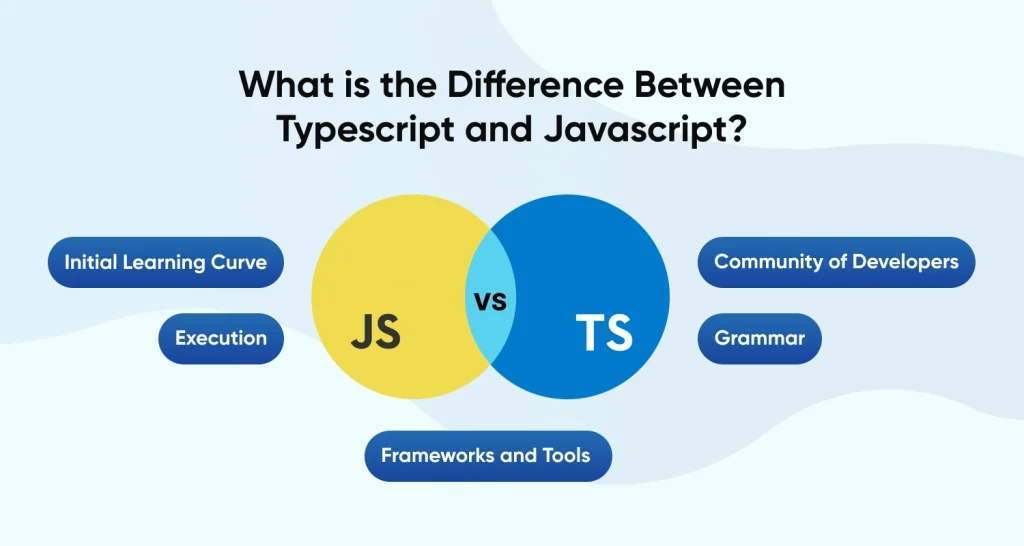Both JavaScript and TypeScript must be familiar to you as they are web development solutions. Did you ever consider the distinction between TypeScript and javascript, though? Did you believe TypeScript to be a component of Javascript? Is one preferable to the other? You can always look forward to the best front-end development company as they have experienced developers to help you.
JavaScript has grown to be one of the most widely used scripting languages among software developers worldwide because of its simplicity and adaptability. However, it becomes problematic because if one technology or language takes off, a rival will also emerge and challenge it.
Let’s understand each term and its differences.
What is TypeScript?
TypeScript is the answer to the question, “What’s better than JavaScript?”
TypeScript is an object-oriented, open-source programming language that Microsoft created and maintained. It contains optional typing and is a superset of JavaScript. It can also be converted into ordinary JavaScript.
Simply put, TypeScript is a statically built programming language for producing terse and understandable JavaScript code. Both client-side and server-side programs can use it, serving the same function as JavaScript. Additionally, TypeScript and JavaScript libraries work well together.
Why TypeScript is Required?
TypeScript is an improved version of JavaScript, as we already mentioned. Because of this, writing TypeScript code requires a lot of knowledge when compared to other programming languages like CoffeeScript (which adds syntactic sugar) and PureScript (which is not at all like JavaScript).
Why Use TypeScript When JavaScript Is Already Available?
The development team initially described JavaScript as a client-side programming language when it was first released. However, as the language was being implemented and used, programmers found that JavaScript could also be used for server-side programming. Its time to hire dedicated programmers for your project.
Quickly gaining enormous popularity was JavaScript. During this time, the JavaScript code grew significantly in weight and complexity. JavaScript is no longer regarded as an object-oriented programming language as a result. This is a major barrier preventing JavaScript from becoming a leading server-side technology at the enterprise level.
The development team created and released TypeScript to fill this gap. So let’s examine what unique features TypeScript offers to provide over JavaScript.
What are the Benefits of TypeScript over JavaScript?
- JavaScript flags issues at runtime, whereas TypeScript always shows mistakes at compilation time throughout development.
- JavaScript does not support TypeScript’s highly typed or static typing.
- TypeScript can be used in any browser or JavaScript engine.
- The excellent toolset includes IntelliSense, which offers live hints as the code is introduced.
- It has the idea of a namespace by declaring a module.

What are the Different Types of TypeScript?
Numerous fundamental types, including Numbers, Array, Tuple, Boolean, String, and many others, are included in TypeScript. Well, JavaScript doesn’t support all of these types. However, the TypeScript documentation contains additional information on them.
In addition, the following TypeScript expression types are listed:
Unknown & Any
Its type-safe system has a type named Any (anything that you wish), which can cover unknown. When you want to get around the type system, you can assign and JavaScript variable here using any. It’s frequently used to describe incoming variables (such as those from third-party APIs) that haven’t been validated yet and whose type isn’t known.
Void
Void is employed when no value is returned. It is typically used for function return types that return nothing.
The return type for something that ought to never occur, like an exception-throwing function, is Never.
Types of Intersection and Union
These kinds enable the creation of bespoke types in accordance with the logic.
You can combine numerous fundamental types into intersection types to create new kinds. As an illustration, suppose we develop a new type called Person that includes first_name:string and last_name:string. You might also say: I want to attract people who are this and that.
What is JavaScript ?
A cross-platform programming language for front-end development and back-end development is called JavaScript. Web pages, backend servers, and interactive apps with engaging user experiences are all built with JavaScript.
It is designed to provide advanced features and functionality to static pages, such as search boxes found on websites like Amazon, interactive maps, often updated material on social media platforms, etc.
What are the Advantages of JavaScript?
Interactive Language: You can build incredible functional elements for a static web page using JavaScript’s rich UI. Both the coder and the user experience engagement, learning, and fun.
Supported Frameworks: The base language, JavaScript, is a lot older than TypeScript. Because many frameworks do not support TypeScript, it has an extra advantage over TypeScript. JavaScript’s built-in libraries and frameworks can speed up and streamline the development process for the developer.
Community: Despite TypeScript’s capabilities and features, JavaScript development services are still in demand. As a result, a sizable developer community began to support JavaScript. A community is a terrific resource for newcomers or amateurs to meet like-minded, knowledgeable people who can mentor, push, and help them.
Both front-end and back-end development are possible with JavaScript. However, the most recent versions now also support back-end development. It expands JavaScript’s consumer base.
When to Use JavaScript Instead of TypeScript?
- Have a Robust Testing Process: JavaScript is the ideal choice if you have a knowledgeable team that uses test-driven development, while TypeScript might cost you a fortune.
- Framework Unsupported: You might not be able to use this functionality if the framework you use does not support TypeScript like EmberJS does.
- tiny Projects: JavaScript is superior to TypeScript for tiny projects.
- Making Games: JavaScript is a terrific option for making web browser-based games, and it’s also a great approach for JavaScript skill testing and evaluation for movie developers.
What is the Difference Between TypeScript and JavaScript?

We must take into account a number of things while comparing the two programming languages TypeScript and JavaScript. Here are the TypeScript vs JavaScript differences below:
Initial Learning Curve
A superset of JavaScript is TypeScript. To write TypeScript code, you should have a fundamental understanding of and familiarity with JavaScript. Additionally, you need to understand the OOPS idea.
On the other side, JavaScript is a well-liked and straightforward scripting language. Many developers utilize JavaScript, CSS, and HTML to build Internet apps. HTML, on the other hand, is challenging since it includes event management, web behavior, animations, and scripting. HTML, on the other hand, is challenging since it includes event management, web behavior, animations, and scripting.
Community of Developers
In a short period of time, TypeScript became widely used and was adopted by numerous businesses. On the Internet, there are a tonne of tutorials and guides you can use to learn TypeScript. However, it does have a very active and supportive community.
Contrarily, compared to TypeScript, JavaScript doesn’t have a sizable user base. Numerous libraries, frameworks, and coding standards are provided by JavaScript. For optimal team performance, it is therefore advisable to understand the web development team structure that best meets your business goals.
Execution
As we all know, TypeScript was created to solve the constraints of JavaScript when employed in high-level, complex applications. Thus, TypeScript shortens the development process and increases developer output.
The only difference between TypeScript and JavaScript is the translation of TypeScript code into JavaScript prior to execution.
Grammar
Variable declaration, the functional paradigm, and the type system are all features that TypeScript offers that JavaScript does not. With support for ECMAScript 2015 Standard features including modules, an arrow function syntax, and classes, its syntax is comparable to JScript and .Net.
The ECMAScript definition is followed by JavaScript as well. But unlike TypeScript, it is not a typed language. It makes extensive use of C’s structured programming language, including if statements, switch clauses, do-while loops, and many others. It provides an event-driven approach and practical programming.
Frameworks and Tools
Microsoft has numerous industry-leading frameworks and editors because it supports TypeScript. It provides error handling during compilation to prevent errors at runtime through a close connection with editors.
On the other hand, there are lots of JavaScript frameworks for web development project requirements on the market. It is a sizable ecosystem that is well-liked by programmers. Developers with expertise in ReactJS, VueJS, Angular, and other frameworks are simple to discover.
Will JavaScript be Replaced by TypeScript?
The quickest response to the previous query is NO, of course! Speaking of TypeScript, it is a completely unique language that only has some of the same basic features as JavaScript. JavaScript cannot be replaced and never will be.
Numerous developers utilize JavaScript, one of the most well-known and fundamental technologies in the software development field, for both client-side and server-side applications.
On the other side, TypeScript is not immediately executed by web browsers. It converts to JavaScript compilation. JavaScript runs directly in the web browser, making it simpler to debug and compile. However, not all projects are designed with TypeScript in mind. As a result, each programming language has a set of traits as well as advantages and disadvantages.
| Parameter | TypeScript | JavaScript |
| Developed | Microsoft in 2012 | Brendan Eich |
| Typing | Dynamic and static typing are both supported by TypeScript. | Loosely written. Only dynamic typing is supported by JavaScript. |
| Ecosystem | TypeScript is a more powerful and logical language that supports static typing. | JavaScript is a basic language that facilitates code compatibility and is easy to read and write. |
| Compilation | It is necessary to compile TypeScript. | There is no need to compile JavaScript. |
| Data Binding | Interfaces and types are used by TypeScript to define the data that is being used. | JavaScript doesn’t present such a concept. |
| Npm Packages | Many npm packages for TypeScript either include static type definitions or have an easier-to-install external one. | JavaScript offers a build-step-free alternative to search and form coding. |
| File Extensions | .tsx and .ts | .js |
| Community | The developer community for TypeScript is tiny. | There is a sizable developer community for JavaScript. |
| Prototyping | In TypeScript, there is a prototyping capability. | Prototyping is not supported by JS. |
Conclusion
We will once more emphasize that JavaScript is best for small web projects to conclude this TypeScript vs. JavaScript performance comparison. Choosing TypeScript is the best option if your team works on challenging or complex projects. Because TypeScript is best suited for huge programs that follow the Object Oriented Programming language, it competes fiercely with JavaScript.
Additional features supported by TypeScript include interfaces, classes, inheritance, and namespaces. Overall, we can conclude that TypeScript is simple to maintain, increases project productivity, and is fantastic for organizing code. Thus, we can simply state that TypeScript’s arrival has filled in the gaps that JavaScript had for a long time, but that it still has a number of advantages and is still widely used.
You can hire JavaScript developers to create dynamic and interactive applications for your next project once you’ve chosen the best one.
Frequently Asked Questions
Why Use Typescript vs. JavaScript?
JavaScript cannot be maintained as easily as TypeScript. JavaScript does not enable abstraction via interfaces, however, TypeScript does. JavaScript does not support decorator annotations, whereas TypeScript does.
Is Typescript Really Different From Javascript?
JavaScript is an object-oriented programming language, whereas TypeScript is a prototype-based language. JavaScript does not support the static typing capability that is available in TypeScript. JavaScript does not support interfaces, although TypeScript does.
Will Typescript Replace JavaScript?
JavaScript cannot be replaced by TypeScript. Simply said, writing JavaScript in TypeScript is a more feature-rich and technically sound process. The first step in running a TypeScript application is to compile the code into JavaScript.







